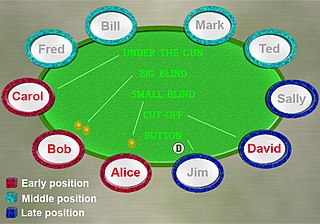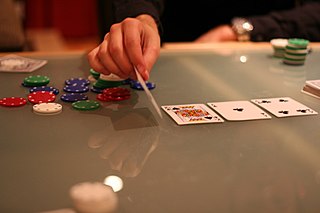Bad beats online
In online poker rooms, bad beats often lead to accusations that the random number generator is "rigged", even though such beats also occur in offline games. Many online poker rooms post statistical data to demonstrate the randomness of the hands generated. [1] In online poker games players have an opportunity to play in "bad beat" tables where the player who has the best losing hand receives an accumulated prize pool. An additional amount of rake is taken from each hand to fund the jackpot. The largest online jackpot to date was €1.25 million, hit in July 2011 with €443,000 going to the loser of the hand. [2]
Players are statistically more likely to experience bad beats online, since playing using a computer allows for more hands played per hour. Also, online players may play multiple cash game tables and/or tournaments at the same time, also increasing the frequency of hands dealt. Also, tells are rendered moot, so players are incapable of reading clues such as body language in aid of deriving the strength of an opponent's hand. Finally, online poker games (especially freeroll tournaments) are far more accessible to the average player who, being average, is less likely to be knowledgeable regarding the techniques of the game, in turn making it more likely they will bet from the gut or intuition rather than experience.
Bad beat jackpot
A bad beat jackpot is a prize that is paid when a sufficiently strong hand is shown down and loses to an even stronger hand held by another player. [3] Not all poker games offer bad beat jackpots, and those that do have specific requirements for how strong a losing hand must be to qualify for the jackpot. For example, the losing hand may be required to be four-of-a-kind or better. There may be additional requirements as well. For example, in Texas hold 'em there is usually a requirement that both hole cards play in both the losing and winning hands, or that where a full house is the minimum (usually aces full of jacks or higher), both hole cards must be used to make the three-of-a-kind in the full house.
Bad beat jackpots are usually progressive, often with a small rake being taken out of each pot to fund the jackpot (in addition to the regular rake). When a jackpot is won, it is usually split among all players sitting at the table at the time of the bad beat with the losing hand getting the largest share, followed by the winning hand, and all the other players dividing the remainder. Generally, only the best losing hand is eligible to win the largest share, even if another hand would also qualify.
Specific rules, collections, payout percentages, and amounts vary greatly from one casino or cardroom to the next, and are sometimes changed.
Five-card draw is a poker variant that is considered the simplest variant of poker, and is the basis for video poker. As a result, it is often the first variant learned by new players. It is commonly played in home games but rarely played in casino and tournament play. The variant is also offered by some online venues, although it is not as popular as other variants such as seven-card stud and Texas hold 'em.

Poker is a family of comparing card games in which players wager over which hand is best according to that specific game's rules in ways similar to these rankings. While the earliest known form of the game was played with just 20 cards, today it is usually played with a standard deck, although in countries where short packs are common, it may be played with 32, 40 or 48 cards. Thus poker games vary in deck configuration, the number of cards in play, the number dealt face up or face down, and the number shared by all players, but all have rules that involve one or more rounds of betting.
In poker, pot odds are the ratio of the current size of the pot to the cost of a contemplated call. Pot odds are compared to the odds of winning a hand with a future card in order to estimate the call's expected value. The purpose of this is to statistically guide a player's decision between the options of call or fold. Raising is an alternative to place this decision on the opponent.

Omaha hold 'em is a community card poker game similar to Texas hold 'em, where each player is dealt four cards and must make their best hand using exactly two of them, plus exactly three of the five community cards. The exact origin of the game is unknown, but casino executive Robert Turner first brought Omaha into a casino setting when he introduced the game to Bill Boyd, who offered it as a game at the Las Vegas Golden Nugget Casino. Omaha uses a 52-card French deck. Omaha hold 'em 8-or-better is the "O" game featured in H.O.R.S.E.
Pai gow poker is a version of pai gow that is played with playing cards, instead of traditional pai gow's Chinese dominoes. The game of pai gow poker was created in 1985 in the United States by Sam Torosian, owner of the Bell Card Club.

In the game of poker, the play largely centers on the act of betting, and as such, a protocol has been developed to speed up play, lessen confusion, and increase security while playing. Different games are played using different types of bets, and small variations in etiquette exist between cardrooms, but for the most part the following rules and protocol are observed by the majority of poker players.

Texas hold 'em is one of the most popular variants of the card game of poker. Two cards, known as hole cards, are dealt face down to each player, and then five community cards are dealt face up in three stages. The stages consist of a series of three cards, later an additional single card, and a final card. Each player seeks the best five card poker hand from any combination of the seven cards; the five community cards and their two hole cards. Players have betting options to check, call, raise, or fold. Rounds of betting take place before the flop is dealt and after each subsequent deal. The player who has the best hand and has not folded by the end of all betting rounds wins all of the money bet for the hand, known as the pot. In certain situations, a "split-pot" or "tie" can occur when two players have hands of equivalent value. This is also called a "chop-pot". Texas hold 'em is also the H game featured in HORSE and in HOSE.

Video poker is a casino game based on five-card draw poker. It is played on a computerized console similar in size to a slot machine.
Caribbean stud poker, also called casino stud poker, is a casino table game with rules derived from five-card stud poker. However, unlike standard poker games, Caribbean stud poker is played against the house rather than against other players. There is no option to bluff or deceive as this is played against the house and not other players.
Online poker is the game of poker played over the Internet. It has been partly responsible for a huge increase in the number of poker players worldwide. Christiansen Capital Advisors stated online poker revenues grew from $82.7 million in 2001 to $2.4 billion in 2005, while a survey carried out by DrKW and Global Betting and Gaming Consultants asserted online poker revenues in 2004 were at $1.4 billion. In a testimony before the United States Senate regarding Internet Gaming, Grant Eve, a Certified Public Accountant representing the US Accounting Firm Joseph Eve, Certified Public Accountants, estimated that one in every four dollars gambled is gambled online.
A progressive jackpot is a jackpot which increases each time the game is played but the jackpot is not won. When the progressive jackpot is won, the jackpot for the next play is reset to a predetermined value, and resumes increasing under the same rule.
Teen patti is a gambling card game that originated in the Indian subcontinent and is popular throughout South Asia. It originated in the English game of three-card brag, with influences from poker. It is also called flush or flash in some areas.

Cash games, also sometimes referred to as ring games or live action games, are poker games played with "real" chips and money at stake, often with no predetermined end time, with players able to enter and leave as they see fit. In contrast, a poker tournament is played with tournament chips worth nothing outside the tournament, with a definite end condition, and a specific roster of competitors.
Advantage gambling, or advantage play, refers to legal methods used to gain an advantage while gambling, in contrast to cheating. The term usually refers to house-banked casino games, but can also refer to games played against other players, such as poker. Someone who practises advantage gambling is often referred to as an advantage player, or AP. Unlike cheating, which is by definition illegal, advantage play exploits innate characteristics of a particular game to give the player an advantage relative to the house or other players. While not illegal, advantage play is often discouraged and some advantage players may be banned by certain casinos.

Casino Hold'em is a casino gambling game. This banking game, introduced by Stephen Au-Yeung in 2000 and now played in live casinos worldwide. It was licensed for use in the United Kingdom in 2007. In addition online casinos offer the game, which is based on the traditional multi-player Texas Hold'em Poker.
The following is a glossary of poker terms used in the card game of poker. It supplements the glossary of card game terms. Besides the terms listed here, there are thousands of common and uncommon poker slang terms. This is not intended to be a formal dictionary; precise usage details and multiple closely related senses are omitted here in favor of concise treatment of the basics.
Stud poker is any of a number of poker variants in which each player receives a mix of face-down and face-up cards dealt in multiple betting rounds. Stud games are also typically non-positional games, meaning that the player who bets first on each round may change from round to round. The cards dealt face down to each individual player are called hole cards, which gave rise to the common English expression ace in the hole for any hidden advantage.
Poker is a popular card game that combines elements of chance and strategy. There are various styles of poker, all of which share an objective of presenting the least probable or highest-scoring hand. A poker hand is usually a configuration of five cards depending on the variant, either held entirely by a player or drawn partly from a number of shared, community cards. Players bet on their hands in a number of rounds as cards are drawn, employing various mathematical and intuitive strategies in an attempt to better opponents.
Draw poker is any poker variant in which each player is dealt a complete hand before the first betting round, and then develops the hand for later rounds by replacing, or "drawing", cards.

Open-face Chinese poker, OFCP, commonly known as Open Face Chinese or OFC, is a variant of Chinese poker where players receive five cards to start and then one card at a time until each player has a 13 card hand legal or not. The game originated in Finland during the mid-2000s and spread to Russia a few years later. Professional poker player Alex Kravchenko, who is credited with introducing the game to the Russian high-stakes community, describes the game as "spreading like a virus". The game was introduced to the United States in 2012.







